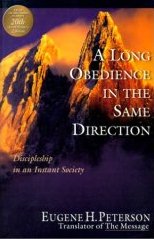 Gregory Boyd's The Myth of a Christian Nation: How the Quest for Political Power is Destroying the Church is the latest book in the "Currently Reading" sidebar to bite the dust. Since I am writing a "book-note" on the book to be published here, I will summarize Boyd briefly and allow any critique I might make to be published there.
Gregory Boyd's The Myth of a Christian Nation: How the Quest for Political Power is Destroying the Church is the latest book in the "Currently Reading" sidebar to bite the dust. Since I am writing a "book-note" on the book to be published here, I will summarize Boyd briefly and allow any critique I might make to be published there.In his introduction, Boyd writes this: "I believe a significant segment of American evangelicalism is guilty of nationalistic and political idolatry.... Rather than focusing our understanding of God's kingdom on the person of Jesus -- who, incidentally, never allowed himself to get pulled into the political disputes of his day -- I believe many of us American evangelicals have allowed our understanding of the kingdom of God to be polluted with political ideals, agendas, and issues" (11).
Boyd argues that for something to be Christian it must look like Jesus, and Jesus looks like someone dying for the people who crucified him. He connects Jesus' sacrificial life to Christians by quoting Ephesians 5:2: "Live a life of love, just as Christ loved us and gave himself up for us as a fragrant offering and sacrifice to God." Boyd believes that Jesus' sacrifice is not simply to be adored, it is to be imitated.
Chapters 1-3 develop the idea that there has never been a Christian nation, since no nation has ever looked liked Jesus who was willing to sacrifice his own life for the sake of those who killed him. All nations are one form or other of the "kingdom of the world," the power set up by God but controlled by demonic forces. The radical alternative was inaugurated by Jesus, the "kingdom of God." All nations, as forms of the kingdom of the world, practice "power-over" people and coerce people by violence to do as the kingdom of the world desires. Only the kingdom of God practices "power-under," the form of power exercised by Jesus Christ when he washed his disciples' feet and died for the people who killed him.
Chapters 4-5 illustrate from historical and contemporary examples how the kingdom of God has been coopted by the kingdom of the world and made little more than a religious version of the kingdom of the world. Boyd suggests that this is best seen in the current motto: "Taking America Back for God."
Chapters 6-8 illustrate five negative consequences of seeing America as a "Christian" nation.
- It harms global missions because the kingdom of God has been associated by people in the rest of the globe with the specific kingdom of the world government that rules in the U.S.
- It harms local missions because of the "pervasive misconception that the civil religion of Christianity in America is real Christianity" (111).
- It harms our spiritual lives because we learn to rely on the "power-over" of the "Christian" U.S. instead of trusting whole-heartedly on the "power-under" power of prayer.
- It harms our relationship with sinners because the myth that America is a Christian nation tempts many of us to see ourselves as the "moral guardians" of the country instead of the "chief of all sinners."
- It harms the advancement of the kingdom of God in general because the myth causes us to look more towards Old Testament theocracy than to New Testament discipleship for examples to live by. In Boyd's view, only Israel has ever had the right to be called a theocracy, and it is American hubris to claim those rights for itself.
Is this book worth reading? Since I am not critiquing yet, I would say "yes." I found several things in the book that I disagreed with, but I still found many more things very helpful in elucidating the difference between the kingdom of the world and the kingdom of God, between true Christianity and the civil religion of America, etc. Any Christian should be edified by these distinctions (which are classically Christian) and by the focus that Boyd pulls consistently back to Jesus, the author and perfector of our faith.
But even if Boyd is right, there are many who would not be able to accept it. Sometimes people have spent too much blood, sweat, and tears going in one direction to change their minds, even if they have figured out that the path leads to destruction. Is the book worth reading? Yes, it is. Will it be difficult for many to read? Yes, very, very likely. It calls everything into question.

